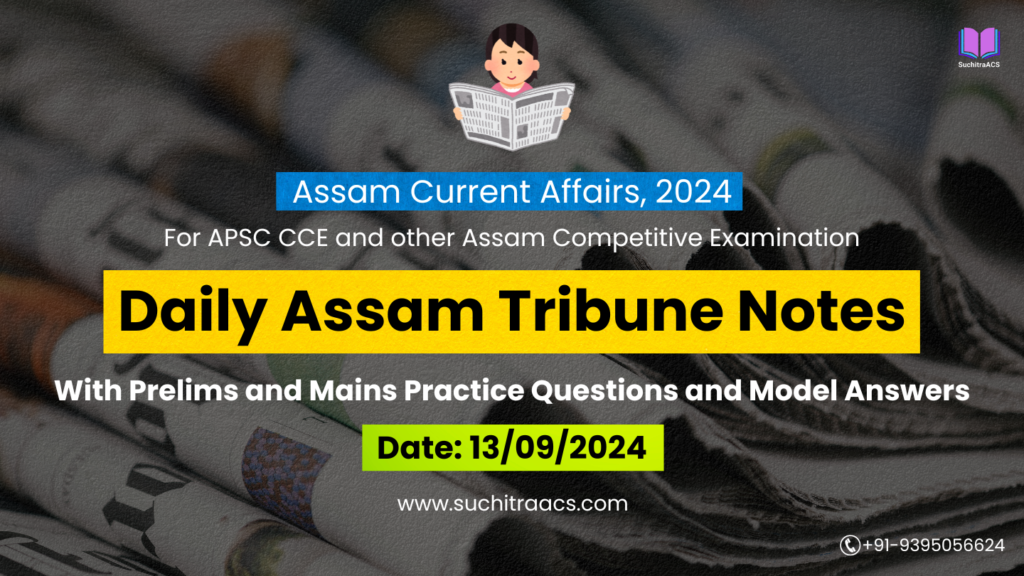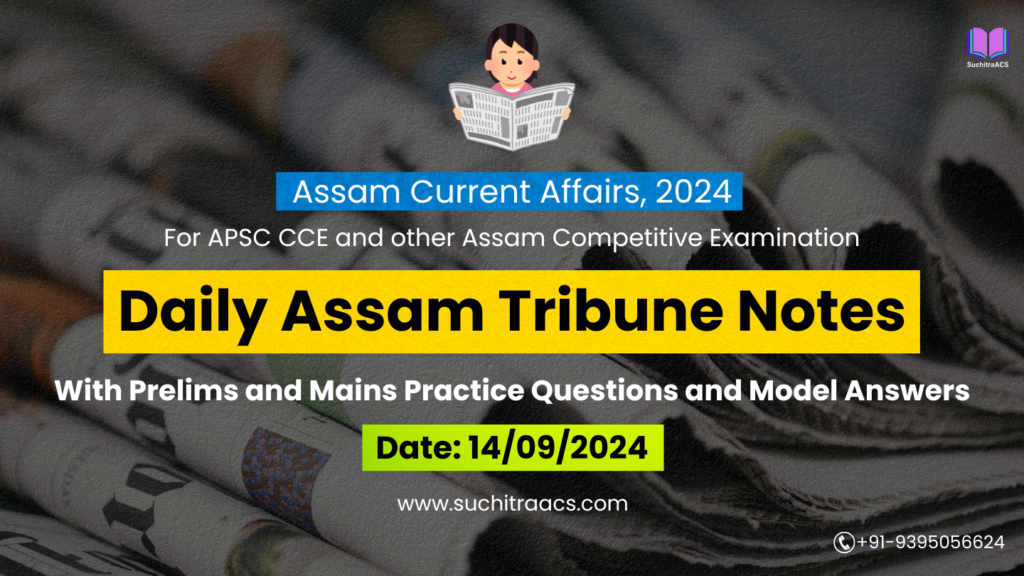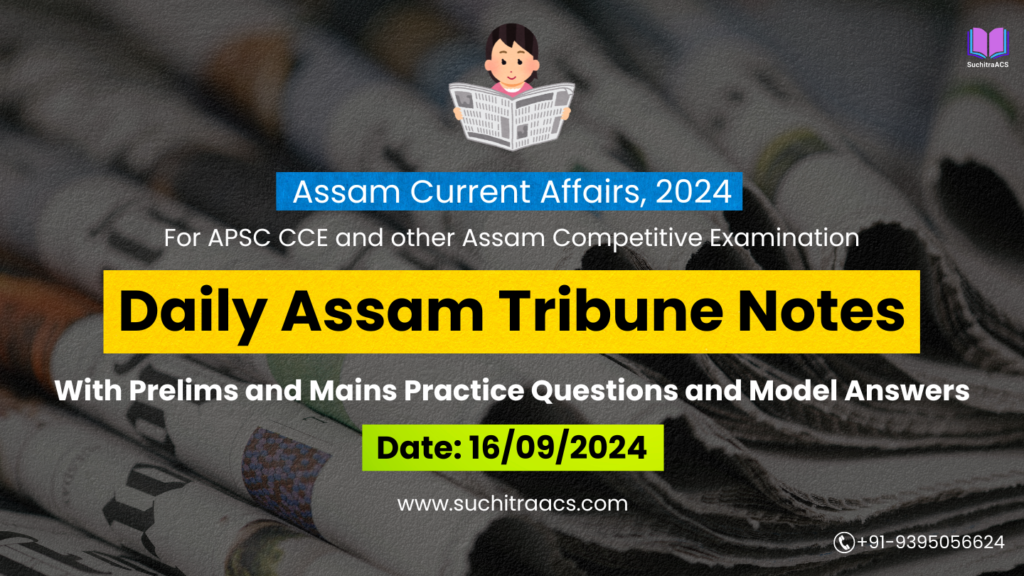APSC Current Affairs: Assam Tribune Notes with MCQs and Answer Writing (05/11/2024)
For APSC CCE and other Assam Competitive examinations aspirants, staying updated with current affairs is vital. This blog covers most important topics from the Assam Tribune today (05-11-2024). These issues are key for both APSC Prelims and Mains preparation, offering insights into the APSC CCE Syllabus.
Topic 1: IIT Guwahati Research Park Partnerships for Sustainable Development
GS Paper 3: Science and Technology, Infrastructure Development
Introduction:
IIT Guwahati’s Research Park Foundation has initiated significant collaborations to advance sustainable development and healthcare in Northeast India. Three Memorandums of Agreement (MoAs) were signed with various institutions, focusing on urbanization, healthcare innovation, and technological skill development.
Key Points:
- The Research Park has partnered with CUBE (Centre for Urbanization, Buildings, and Environment), Pravartak of IIT Madras, and the Assam Government-IITG Healthcare Foundation.
- Initiatives include establishing a 400-bed super-specialty hospital, an advanced urban infrastructure hub, and skill development centers for high-tech sectors.
- The collaboration aims to address urban challenges, healthcare self-reliance, and sustainable development in Northeast India.
Prelims Pointers:
- CUBE: A center under IIT Madras focusing on sustainable infrastructure and urban planning.
- Make in India: A national initiative encouraging indigenous production and reducing dependence on imports.
- IIT Guwahati Research Park: A hub for innovation, industry collaboration, and research.
Mains Pointers:
- Importance:
- Healthcare Advancement: Reduces dependency on imported medical equipment, fostering self-reliance.
- Skill Development: Provides specialized training in semiconductor technology, essential for technological progress.
- Sustainable Urban Planning: Helps create eco-friendly urban frameworks suited for the unique needs of Northeast India.
- Industry-Academia Collaboration: Strengthens ties between research institutions and industry for regional growth.
- Technological Innovation: Drives advancements in biotechnology, deep tech, and electronics through indigenous development.
- Challenges:
- Resource Allocation: Requires substantial investment and consistent funding for long-term projects.
- Talent Retention: Skilled professionals may seek opportunities outside the region due to limited high-tech job availability.
- Infrastructure Needs: Upgrading infrastructure to support advanced healthcare and urban planning.
- Public Awareness: Ensuring local awareness and engagement with new technologies and sustainable practices.
- Coordination Among Stakeholders: Successful collaboration demands synchronized efforts from multiple agencies.
- Way Ahead:
- Government Incentives: Provide tax breaks and subsidies to attract tech companies and skilled professionals to the region.
- Outreach Programs: Conduct community outreach to educate on health and urban sustainability.
- Enhanced Funding: Secure public-private partnerships to ensure continuous funding for projects.
- Skill Upgradation: Regularly update training programs to keep pace with technological advancements.
- Monitoring Mechanisms: Set up systems to evaluate the impact and progress of these initiatives.
Conclusion:
The IIT Guwahati Research Park’s initiatives mark a transformative step toward sustainable urban development and healthcare self-reliance in Northeast India. A committed approach to innovation, skill-building, and collaboration can enable holistic regional growth.
Topic 2: Financial Crisis and Appeal for Aid by Actor Ting Tong
GS Paper 2: Social Justice, Welfare Policies
Introduction:
Samsul Ali, known as Ting Tong in the Assamese entertainment industry, has made a public appeal for government aid due to financial hardship and health issues. His condition reflects the challenges faced by many artists who lack financial and social support structures.
Key Points:
- Ting Tong, partially paralyzed since 2017, relies on minimal income from his wife’s small shop and receives limited financial aid under the Orunodoi Scheme.
- He has expressed a desire to return to acting and is appealing for financial assistance and a wheelchair from the government.
- His struggle has highlighted the need for comprehensive welfare measures for artists facing health and economic challenges.
Prelims Pointers:
- Orunodoi Scheme: A social welfare scheme in Assam providing financial assistance to vulnerable groups, including persons with disabilities.
- Assamese Entertainment Industry: Faces challenges with limited financial support for its artists.
- Disability Rights: Enshrined under the Rights of Persons with Disabilities Act, 2016, ensuring support for people with disabilities.
Mains Pointers:
- Importance:
- Financial Security: Ensures a basic income for artists facing health or financial crises.
- Healthcare Access: Enables access to essential healthcare for low-income individuals.
- Cultural Preservation: Supports artists who contribute to Assam’s cultural heritage.
- Social Welfare: Reflects government commitment to inclusive welfare policies.
- Dignity and Self-Reliance: Assists individuals in maintaining dignity by supporting livelihoods.
- Challenges:
- Irregular Assistance: Delays in receiving funds under schemes like Orunodoi reduce effectiveness.
- Lack of Comprehensive Coverage: Existing welfare schemes often provide insufficient support for long-term health needs.
- Limited Public Awareness: Many artists and disabled individuals are unaware of available welfare schemes.
- Financial Dependency: Dependence on minimal government aid can lead to long-term financial insecurity.
- Health Infrastructure Gaps: Lack of accessible, affordable healthcare for low-income artists in Assam.
- Way Ahead:
- Dedicated Welfare Fund: Establish a welfare fund specifically for artists and performers in need.
- Timely Disbursement: Ensure regular and prompt payments under the Orunodoi and similar schemes.
- Healthcare Subsidies: Provide subsidized healthcare facilities for low-income artists facing chronic illnesses.
- Public Awareness Drives: Conduct campaigns to inform artists and the disabled about welfare entitlements.
- Long-Term Skill Development: Offer training programs for artists to diversify their income sources.
Conclusion:
The plight of Ting Tong highlights the urgent need for a more inclusive welfare system supporting the livelihoods of artists and the disabled. By implementing sustainable welfare initiatives, Assam can ensure a dignified life for its struggling creative talents.
Topic 3: Financial Irregularities at JB Law College, Guwahati
GS Paper 2: Governance, Ethics in Public Administration
Introduction:
The governing body of JB Law College, Guwahati, has suspended three officials, including the principal, over alleged financial irregularities. An inquiry committee is being set up to investigate the charges and ensure accountability.
Key Points:
- The college principal, accountant, and work coordinator have been suspended based on an audit report and findings of irregularities.
- The allegations involve financial and administrative misconduct in the college’s operations.
- A District Judge-led inquiry committee will examine the charges and submit a report.
Prelims Pointers:
- Audit Report: An independent financial evaluation conducted to check for irregularities in institutions.
- Governance in Educational Institutions: Ensuring transparency and accountability in the management of colleges and universities.
- Ethics in Administration: The principles of ethical conduct in the administration, crucial for trust in public institutions.
Mains Pointers:
- Importance:
- Institutional Integrity: Ensures colleges maintain high standards of governance.
- Financial Accountability: Holds administrators responsible for the appropriate use of funds.
- Student Trust: Builds trust among students and parents in the institution’s management.
- Public Faith: Reinforces public confidence in the oversight of educational bodies.
- Precedent for Transparency: Sets an example for other institutions on the importance of transparent governance.
- Challenges:
- Administrative Lapses: Inadequate checks and balances can lead to misuse of funds.
- Resistance to Accountability: Officials may resist audits or external scrutiny, complicating investigations.
- Student Disruption: Administrative issues may affect academic schedules and student morale.
- Public Perception: Allegations of misconduct can harm the institution’s reputation.
- Resource Limitations: Limited staff or funding can hinder comprehensive internal audits and regular checks.
- Way Ahead:
- Regular Audits: Implement routine financial audits to ensure early detection of irregularities.
- Code of Ethics: Establish a code of ethics for educational institutions to guide the conduct of staff and administration.
- Training Programs: Provide training for administrative staff on ethics and transparency.
- Independent Oversight: Appoint independent committees for investigating complaints and allegations.
- Enhanced Governance Policies: Strengthen governance frameworks to prevent misuse of funds.
Conclusion:
The JB Law College incident underscores the need for ethical governance in educational institutions. Establishing a framework of transparency and accountability is essential for the integrity and reputation of Assam’s educational sector.
Topic 4: India’s Re-election as President of the International Solar Alliance (ISA)
GS Paper 2: International Relations, Renewable Energy Initiatives
Introduction:
India has been re-elected as the President of the International Solar Alliance (ISA) for 2024-2026, with France as Vice-President. The alliance, with over 120 member countries, promotes global solar energy adoption, especially in least-developed countries, to combat climate change and enhance energy security.
Key Points:
- Union Minister Pralhad Joshi announced India’s presidency at the 7th General Assembly of ISA.
- Key initiatives include the Green Hydrogen Innovation Centre, ISA Knowledge Series, and Global Solar Facility for Africa, aimed at accelerating renewable energy adoption.
- India’s leadership in ISA aligns with its commitment to renewable energy targets and combating climate change.
Prelims Pointers:
- International Solar Alliance (ISA): An alliance of solar-resource-rich countries, primarily aimed at reducing dependence on fossil fuels and promoting solar energy.
- Green Hydrogen Innovation Centre: An ISA initiative to advance research in hydrogen as a renewable energy source.
- Global Solar Facility: An ISA-led initiative to finance solar projects, with a focus on Africa.
Mains Pointers:
- Importance:
- Climate Action Leadership: Reinforces India’s position as a global leader in renewable energy and climate change mitigation.
- Technology Transfer: Facilitates sharing of solar technology and expertise among member nations.
- Energy Security: Reduces reliance on fossil fuels, enhancing energy security for member countries.
- Economic Benefits: Solar projects create job opportunities and stimulate green economic growth.
- Global Cooperation: Strengthens international ties, especially with developing countries in Africa and Asia.
- Challenges:
- Funding Constraints: Solar projects require significant initial investment, limiting accessibility for poorer nations.
- Technical Capacity: Many member countries lack the technical expertise needed for large-scale solar projects.
- Infrastructure Gaps: Lack of adequate infrastructure in developing countries hinders solar energy adoption.
- Policy Differences: Varied energy policies across member countries can complicate unified action.
- Resource Scarcity: Solar panel production is resource-intensive, with material scarcity posing a challenge to scaling up.
- Way Ahead:
- Enhanced Funding: Increase ISA’s funding mechanisms, such as the Global Solar Facility, to support under-resourced nations.
- Skill Development Programs: Conduct training programs for member countries to build technical expertise.
- Research Collaboration: Promote research in solar storage and efficiency to make solar energy more viable.
- Infrastructure Support: Collaborate with global organizations to fund infrastructure development in member nations.
- Flexible Policies: Encourage adaptable policy frameworks to accommodate the energy needs of diverse member states.
Conclusion:
India’s leadership in the ISA emphasizes its commitment to global climate action and renewable energy. Through strategic initiatives and enhanced international cooperation, the alliance can play a pivotal role in achieving sustainable energy goals worldwide. government, educational institutions, and communities can revitalize these art forms and ensure their survival for future generations.
APSC Prelims Practice Questions
Topic 1: IIT Guwahati Research Park Partnerships for Sustainable Development
Question 1: With reference to IIT Guwahati’s recent partnerships for sustainable development, consider the following statements:
- CUBE is a center focused on sustainable infrastructure and urban planning, affiliated with IIT Madras.
- The partnership aims to create a skill development center specifically for semiconductor technology.
- The MoUs include the establishment of a 400-bed super-specialty hospital in Assam.
Which of the statements given above is/are correct?
A. 1 and 2 only
B. 2 and 3 only
C. 1 and 3 only
D. 1, 2, and 3
Answer: D. 1, 2, and 3
Explanation:
- Statement 1 is correct. CUBE, affiliated with IIT Madras, focuses on sustainable infrastructure and urban planning.
- Statement 2 is correct. The partnership includes skill development centers for high-tech sectors, such as semiconductor technology.
- Statement 3 is correct. The partnership also includes establishing a 400-bed super-specialty hospital in Assam to advance healthcare.
Thus, the correct answer is D.
Topic 2: Financial Crisis and Appeal for Aid by Actor Ting Tong
Question 2: Regarding the welfare initiatives for artists in Assam, consider the following statements:
- The Orunodoi Scheme provides financial assistance specifically designed for artists facing financial hardships.
- The Rights of Persons with Disabilities Act, 2016, includes provisions for financial support to disabled individuals in the entertainment industry.
- The Orunodoi Scheme also aims to support vulnerable groups, including persons with disabilities, in Assam.
Which of the statements given above is/are correct?
A. 1 and 2 only
B. 3 only
C. 1 and 3 only
D. 2 and 3 only
Answer: B. 3 only
Explanation:
- Statement 1 is incorrect. The Orunodoi Scheme provides financial assistance to vulnerable groups, but it is not exclusively for artists.
- Statement 2 is incorrect. The Rights of Persons with Disabilities Act, 2016, aims to protect rights and ensure welfare, but it does not specifically target financial aid for disabled individuals in entertainment.
- Statement 3 is correct. The Orunodoi Scheme in Assam aims to support vulnerable groups, including persons with disabilities.
Thus, the correct answer is B.
Topic 3: Financial Irregularities at JB Law College, Guwahati
Question 3: Which of the following statements about governance in educational institutions, with reference to the recent incident at JB Law College, Guwahati, is/are correct?
- Audit reports are essential for maintaining financial transparency and accountability in educational institutions.
- The code of ethics for educational institutions mandates financial audits only in the case of public funding.
- Independent oversight committees are crucial for investigating financial misconduct in educational institutions.
Select the correct answer using the code given below:
A. 1 only
B. 1 and 3 only
C. 2 and 3 only
D. 1, 2, and 3
Answer: B. 1 and 3 only
Explanation:
- Statement 1 is correct. Audit reports help maintain financial transparency and accountability, which is crucial in educational institutions to prevent financial misconduct.
- Statement 2 is incorrect. The need for financial audits is not limited to institutions with public funding; audits are a best practice for maintaining financial integrity in all institutions.
- Statement 3 is correct. Independent oversight committees are crucial for conducting fair and unbiased investigations into financial misconduct.
Thus, the correct answer is B.
Topic 4: India’s Re-election as President of the International Solar Alliance (ISA)
Question 4: With reference to the International Solar Alliance (ISA), consider the following statements:
- The ISA’s primary goal is to promote solar energy in resource-rich countries.
- India’s recent re-election as ISA President includes plans to launch a Global Solar Facility for Africa.
- ISA’s Green Hydrogen Innovation Centre aims to advance solar technology for hydrogen production.
Which of the statements given above is/are correct?
A. 1 and 2 only
B. 2 and 3 only
C. 1 and 3 only
D. 1, 2, and 3
Answer: D. 1, 2, and 3
Explanation:
Statement 3 is correct. ISA’s Green Hydrogen Innovation Centre aims to support research in using solar energy for green hydrogen production, a renewable fuel.
Thus, the correct answer is D.
Statement 1 is correct. The ISA focuses on promoting solar energy, especially in solar-resource-rich countries, to reduce fossil fuel dependency.
Statement 2 is correct. India’s recent re-election includes initiatives such as the Global Solar Facility for Africa to enhance solar project financing.
APSC Mains Practice Question
Topic: Role of Research and Innovation in Sustainable Development in Northeast India
Question: Critically analyze the role of IIT Guwahati’s Research Park initiatives in promoting sustainable development and healthcare innovation in Northeast India. What challenges does it face, and suggest measures to enhance its effectiveness in addressing regional needs. (250 words)
Model Answer:
Introduction:
IIT Guwahati’s Research Park, through partnerships with CUBE, Pravartak of IIT Madras, and the Assam Government-IITG Healthcare Foundation, has launched initiatives aimed at sustainable urbanization, healthcare, and technological skill development in Northeast India. These collaborations mark a significant step towards fostering regional innovation and self-reliance in essential sectors.
Body:
Role in Promoting Sustainable Development:
- Healthcare Self-Reliance: The establishment of a 400-bed super-specialty hospital aims to reduce dependence on imported medical equipment, promoting local healthcare innovation and improving access to advanced medical services.
- Skill Development: The park’s initiatives in high-tech training, particularly in semiconductor technology, are crucial for building a skilled workforce that can drive technological growth and self-sufficiency in the region.
- Sustainable Urbanization: Collaboration with CUBE focuses on eco-friendly urban infrastructure suited to the environmental needs of Northeast India, addressing urban challenges while promoting sustainability.
- Industry-Academia Collaboration: By connecting research with industry, the park enhances regional growth opportunities, supporting local businesses and creating employment.
- Technological Advancement: Promotes innovations in biotechnology, electronics, and deep tech, contributing to India’s “Make in India” initiative and reducing reliance on foreign technology.
Challenges:
- Funding and Resources: Long-term sustainability requires consistent funding, which may be challenging in a region with limited industrial investment.
- Talent Retention: Many skilled professionals migrate to other regions due to limited job opportunities, affecting the research park’s capacity to sustain talent.
- Infrastructure Constraints: Infrastructure to support advanced healthcare and urban planning is still underdeveloped in the Northeast.
- Public Engagement: Low public awareness may hinder the adoption of new technologies and sustainable practices.
- Coordination Among Stakeholders: Effective collaboration requires synchronized efforts among multiple institutions and agencies, which can be challenging.
Measures to Enhance Effectiveness:
- Government Incentives: Provide tax breaks and subsidies to attract private companies, investors, and skilled professionals to the region.
- Public Awareness Programs: Conduct outreach campaigns to educate local communities on healthcare, urban sustainability, and the benefits of new technologies.
- Strengthen Public-Private Partnerships: Encourage collaborations with private sector investors to secure funding and resource support.
- Skill Development Programs: Update training programs regularly to keep pace with technological advancements, ensuring a well-prepared workforce.
- Monitoring and Evaluation: Establish mechanisms to assess the impact and progress of initiatives to ensure alignment with regional needs and make necessary adjustments.
Conclusion:
The IIT Guwahati Research Park’s initiatives hold transformative potential for Northeast India’s sustainable development and healthcare self-reliance. Addressing challenges through funding, awareness, and skilled workforce development can enable the region to harness these initiatives fully, fostering long-term growth and innovation.
✨ Worried about APSC CSAT?

🔔 Join Our WhatsApp Study Group!
For exclusive access to premium quality content, including study materials, current affairs, MCQs, and model answers for APSC CCE and other Assam competitive exams.
Click here to join: SuchitraACS Study WhatsApp Group
📚 Want to know more about SuchitraACS’s most affordable courses?
Click here to know more: SuchitraACS Courses for APSC CCE and Assam Competitive Examinations




